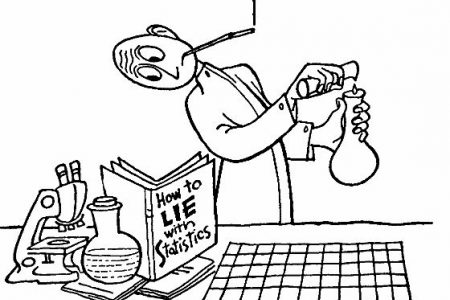Waiting time
Can we beat time when waiting in line? Can we beat the odds when gambling?
The columns of Prof. Ionica Smeets are always a joy to read. Last week, she wrote about the time we spend waiting when we go to the bathroom or the supermarket (Sir Edmund Volkskrant, August 27). She wrote that it would be more efficient if supermarkets combined all the lines into one. This would lower the average waiting time a lot, because nobody would be ‘trapped’ behind someone who was laboriously counting out the dimes for his groceries.
The total waiting time, and therefore the average waiting time remains equal
I found this a marvelous idea! My rebel-communist-with-a-fondness-for-efficiency within was getting enthusiastic, already looking forward to the next visit to the supermarket, where it would call out: “Waiting people of the world, unite! Unite into a single line and everyone will be home earlier!” Unfortunately, after some thinking, I realized this may be incorrect, if there are never any registers that are available, but not used by costumers. In practice, people will exit their line whenever another register becomes available. Unless this line switching takes up a substantial amount of time, the total waiting time, and therefore the average waiting time, remains equal if everyone joins a single line. The thing that does get reduced is the variation in waiting time: Although there will be fewer customers (or bathroom users) with an extremely long waiting time, there will also be fewer with an extremely short waiting time.
Dice have no memory of previous throws
This was disappointing, but the column also provided me with intellectual consolation: it reminded me of my favorite demonic probability distribution: the exponential, or waiting-time distribution. I call it demonic, because it is a memoryless distribution, which often seems unfair: earlier outcomes do not influence future outcomes. For example, if I have thrown a dice ten times without throwing a six, the probability that my next throw will be a six is exactly equal to the probability of throwing six on the first throw. Which is counter-intuitive, or maybe almost unfair: if I have not thrown a six for a while, I might think the probability of getting a six on the next throw increases, but it does not. Dice have no memory of previous throws.
Sometimes you win, sometimes you lose
However, I remember talking to a friend who was convinced that dice and slot machines and things you find in a casino do have memory. He used to brag about earning his rent in the casino every month. I had a hard time believing this and told him: “But the house always wins, right?” He told me: “No, your luck always changes, right? Sometimes you win, sometimes you lose. After winning for a while, you are bound to start losing at some point. And after losing for a while, you are bound to start winning at some point. So when I go to the casino, as long as I have lost money that day, I keep on playing. And I only quit when I have more money than I brought with me.” Of course, it is not entirely impossible that with this strategy, he has won more money than he has lost. But it is not very probable either. The reality is that in casinos the house almost always wins, and customers only very rarely.
The slot machine has no memory of your losses
Of course, I cannot be sure if my friend was lying. Maybe he has made money in the casino, overall. But not because his strategy is a winning one. If you lose ten times in a row at a slot machine, the probability of losing the next ten times does not decrease, it remains exactly the same. So, if you are losing money at the casino, you should not be thinking: great, I will soon be winning! The slot machine has no memory of your losses. It only ‘knows’ what your probability of winning is, which is obviously very low because you have been losing. You should get the *beep* out of there!





